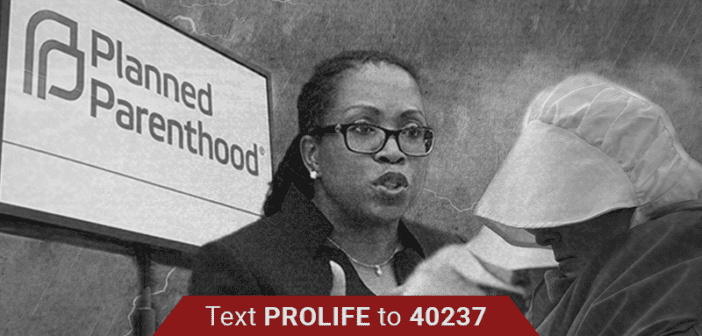When Joe Biden nominated Ketanji Brown Jackson to the Supreme Court of the United States (SCOTUS), her eventual confirmation, barring crippling scandal or a monumental collapse, appeared nothing short of inevitable.
Notwithstanding the better efforts of Senate Republicans, such scandal or collapse never arrived. Little has unsettled the prevailing prediction that Judge Jackson will soon be Justice Jackson. Therefore, it’s worth pausing to reflect on her confirmation hearings and contemplate how Jackson might approach the law, including Pro-Life laws, from her new commanding post as a Supreme Court Justice.
There are broadly two types of judges. On one side there are those who interpret and apply the law as an inflexible instrument of human governance. Then there are others who believe the law is elastic and moldable on an ad hoc basis—a kind of living constitutionalism. The former believe words mean something when they are written and that the meaning of those words endures through cultural and regime change. The latter believe words merely articulate general principles that are necessarily shaped by present practice and preferences. The former are judges who adjudicate disagreements over a law’s meaning and application. While the latter act more as legislators who insert their policy ideals into the function of the law.
Originalism—the mode of constitutional interpretation that looks toward the document’s original public meaning—has framed the debate in these terms. For decades, progressive legal scholars and pundits mocked originalism as an antiquated and fantastical conception of constitutional interpretation. Criticisms were harsh and frequent, but originalism only grew more prevalent and refined. Even progressives started to formulate their arguments in originalist terms—to avoid looking like legislators, they have to at least speak like judges.
Who is Ketanji Brown Jackson: a judge or a legislator? At the very least, she wants to distinguish herself as an originalist. When asked about her judicial philosophy, Jackson responded by emphasizing, “I believe that the Constitution is fixed in its meaning. I believe that it’s appropriate to look at the original intent, original public meaning, of the words when one is trying to assess because, again, that’s a limitation on my authority to import my own policy.” A bona fide originalist could scarcely provide a better summary of originalism.
Sadly, Jackson’s response was nothing new, thereby offering little evidence that she will defect from the progressive orthodoxy of living constitutionalism. After all, Justice Elena Kagan, a progressive on SCOTUS, has noted, “we’re all originalists now.” And Kagan, who often writes her opinions with a peculiar originalist flourish, rarely embraces conservative outcomes.
Merely surveying Jackson’s assertions of judicial philosophy may only yield errant conclusions. Kagan is no adherent of originalism, no matter how deeply she couches her opinions in its language. If Jackson—unlike Kagan and many other impostors—is truly an originalist, then Joe Biden and his team of advisors failed at perhaps their easiest job. However, more likely is that Jackson is no originalist, and all the political players know it.
To reveal the truth about Jackson, we must examine her position on particular issues and in concrete cases.
Confirmation hearings seldom provide insight here. When asked about Roe v. Wade, Jackson replied that the ruling is “the settled law of the Supreme Court concerning the right to terminate a woman’s pregnancy.” This answer is as true as it is evasive and meaningless. No one disputes Roe v. Wade is a current SCOTUS precedent. What we want to know, and what Jackson refused to illuminate, is whether she agrees the decision is rooted in the Constitution or a complete legal fiction.
Next, when she elaborated on what it might take to reverse Roe v. Wade, she simply recounted different considerations such as the decision’s workability and the public’s reliance on the outcome. Perfectly true. And truly unhelpful.
While Jackson might be able to obscure her positions during the confirmation process, her record cannot hide. One particular case emerges from the others. In 2001, the United States Court of Appeals for the First Circuit determined a Massachusetts law that established speech “buffer zones” around abortion facilities did not violate the First Amendment’s guarantee of free speech. This was the absurd outcome Ketanji Brown Jackson advocated when she co-authored an amicus brief in support of the Massachusetts law. But where Jackson and the First Circuit believed unfettered abortion access trumps the freedom of speech, even the progressive justices on SCOTUS showed reservations. Thirteen years later, the Court unanimously ruled that these speech “buffer zones” violate the First Amendment.
Admittedly, two decades supply quite a bit of time for Jackson to rethink her previous beliefs and advocacy. Yet NARAL Pro-Choice America doesn’t think her opinion has changed, nor does Planned Parenthood. The abortion giant celebrated Jackson’s nomination, attesting that “this nomination is also part of essential work to rebuild the courts and protect our health and rights [euphemisms for abortion].” This wholehearted optimism does not inspire confidence that Jackson will not be simply a pawn of Planned Parenthood and the abortion industry.
With Joe Biden and a Democrat-controlled Senate, Jackson merely had to avert a disastrous blunder. Even so, derailing her nomination would not have delivered a lasting victory. Biden would have just nominated someone of like mind. Though Republicans took their best shots, Jackson is now sailing smoothly toward SCOTUS. A confirmation vote is expected in the next couple of weeks.
Fortunately, Ketanji Brown Jackson will have no impact on Dobbs v. Jackson Women’s Health Organization, wherein the justices are deliberating whether to keep Roe or return the abortion question to the states. True neutrality—that is, originalism properly understood—cannot save Roe from becoming a relic of a past progressive SCOTUS.
When Jackson arrives sometime after a decision in Dobbs, will she approach the law with the neutrality of an impartial judge? Not likely.


